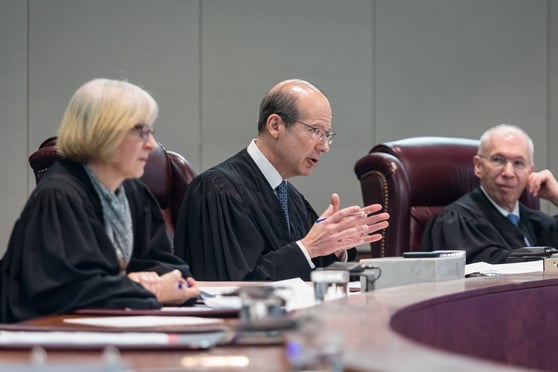
New Jersey Chief Justice Stuart Rabner flanked by Associate Justices
Jaynee LaVecchia and Barry Albin
The Supreme Court of New Jersey heard arguments February 3 on whether the pharmaceutical giant Pfizer obtained genuine consent via an emailed document to require that a flight attendant on company aircraft resolve any dispute with the company through arbitration not litigation.
Amy Skuze, a Buddhist, held a quasi-religious objection to injection of any animal protein. She therefore refused to accede to a Pfizer company policy that flight attendants receive the yellow fever vaccine. It cost her her job, she sued alleging failure to reasonably accommodate her religious beliefs. Pfizer moved to compel arbitration saying that she had consented to arbitration. Pfizer had sent a mass email to employees described as "assigning" to each employee recipient "the activity of taking an on-line module to review the [company's] Mutual Arbitration and Class Waiver Agreement and Acknowledgement." The Appellate Division of Superior Court reversed the trial court's order compelling arbitration. The state high court granted review.
- gwc
New Jersey Supreme Court Weighs Fairness of Electronic Employee Arbitration Agreement in Pfizer Case | New Jersey Law Journal
by Suzanne Parmley
In Skuse v. Pfizer Inc., the justices are considering whether to uphold the Appellate Division’s ruling from January 2019 that plaintiff Amy Skuse didn’t assent to the arbitration agreement with Pfizer because the term “acknowledge” next to the click box did not rise to the level of “agree.” The appeals panel ruled it simply wasn’t enough.
“The issue at hand is the language: Do you acknowledge? What does that mean here?” Chief Justice Stuart Rabner observed aloud, as arguments got underway at the Richard J. Hughes Justice Complex.
Justice Barry Albin asked Pfizer’s attorney, Thomas Linthorst of Morgan Lewis & Bockius’ Princeton office, whether the court was being asked to treat arbitration agreements differently from other waiver-of-rights cases.
“The state has the power to regulate a wide range of contracts that aren’t protected by federal statutes,” Linthorst said, looking directly at Albin. “But arbitration agreements are protected by federal statutes.”
Linthorst added: “The Plain Language Act does not apply to every arbitration agreement, but the waiver-of-rights agreement does.”
To which Justice Jaynee LaVecchia asked: “Does the Appellate Division decision put more pressure on the employer—like your client—to terminate employees if they don’t agree with the provision?”
“’If you want to keep working here, here are the terms and conditions,’” Linthorst said. “So [the employer] put the decision in the hands of the employee—you decide if you want to keep working here.”
Linthorst said, “If email is the traditional manner of communication between employer and employee—and the employer gives reasonable notice—I think the employee is obligated to … the employer gave them the opportunity … to acknowledge the arbitration agreement.”
Justice Anne Patterson queried Linthorst: “Was this really training? I know they considered it module training.”
“I think it’s fair to say that,” Linthorst said. “This was a training platform. This was the platform by which [employees] got important communications. The emails are about arbitration in the subject line. It’s all about arbitration. There was no confusion about what we were talking about. … It was not about parking spaces.”

No comments:
Post a Comment